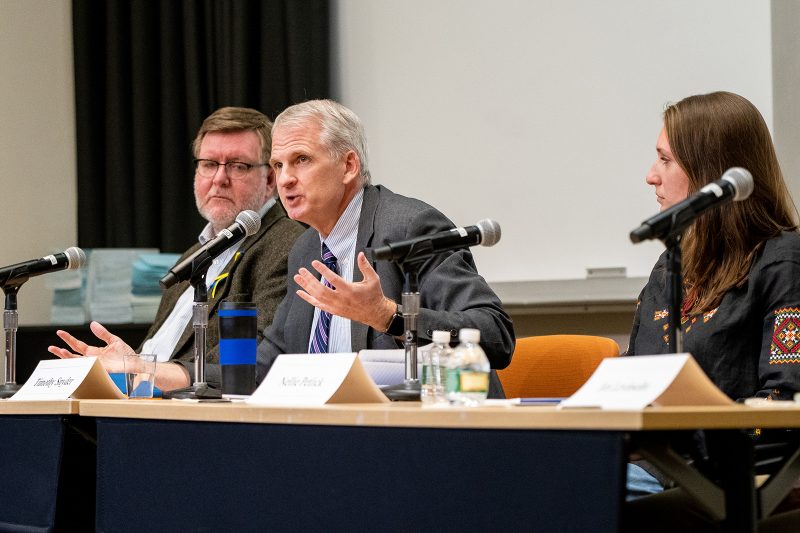Panelists included Arne Westad, Tim Snyder and Nellie Petlick
In the aftermath of Russia’s shocking invasion of Ukraine, the Jackson Institute for Global Affairs convened a panel of Yale experts to offer insight on the unfolding situation and a short history of the troubled relationship between the two neighboring countries.
On a frigid Friday morning, about 150 attendees packed the Luce Hall auditorium to hear from the speakers, including: Timothy Snyder, the Richard C. Levin Professor of History and an award-winning author who has written extensively about Ukraine and Russia; Arne Westad, Elihu Professor of History and Global Affairs whose past research focused on the history of the Cold War and China-Russia relations; and Nellie Petlick, a Jackson graduate student who spent four years in Ukraine first as a Peace Corps Volunteer and later on the staff of EducationUSA.
Jim Levinsohn, Jackson’s director, kicked off the event by acknowledging the Ukrainian students in attendance and by asking the two historians to provide some historical context for the current moment.
Snyder contrasted Russian President Vladimir Putin’s stance during the 2014 invasion of Crimea and Russian propaganda that preceded it with Putin’s more defensive attitude now. “The relationship between Putin and his own people is different this time,” Snyder asserted, citing the protests that have erupted in the country.
Snyder underscored the fallacy of Putin’s assertions that Ukraine is not a legitimate nation, despite the fact that it has never been governed as a Russian state. “Putin is forgetting actual Soviet history,” he said.
Westad offered insight on the reaction by China, which maintains close ties to Russia. “The Chinese leadership are getting increasingly embarrassed,” he said, calling for Western allies to push harder on Beijing to intervene. “China potentially has more influence here. With great power comes great responsibility,” Westad said.
Western countries can also help avoid a full-blown world war by re-supplying the Ukrainians, Westad said, pointing to the recent decisions by neutral countries Finland and Sweden to provide weapons.
When asked to predict when the conflict might end, Snyder shared his vision of a clean energy future in which hydrocarbon oligarchies such as Russia hold less sway in global politics.
In closing, Petlick asked audience members to keep Ukraine top of mind in the days and weeks ahead. “Resist the urge to disengage,” she said.
